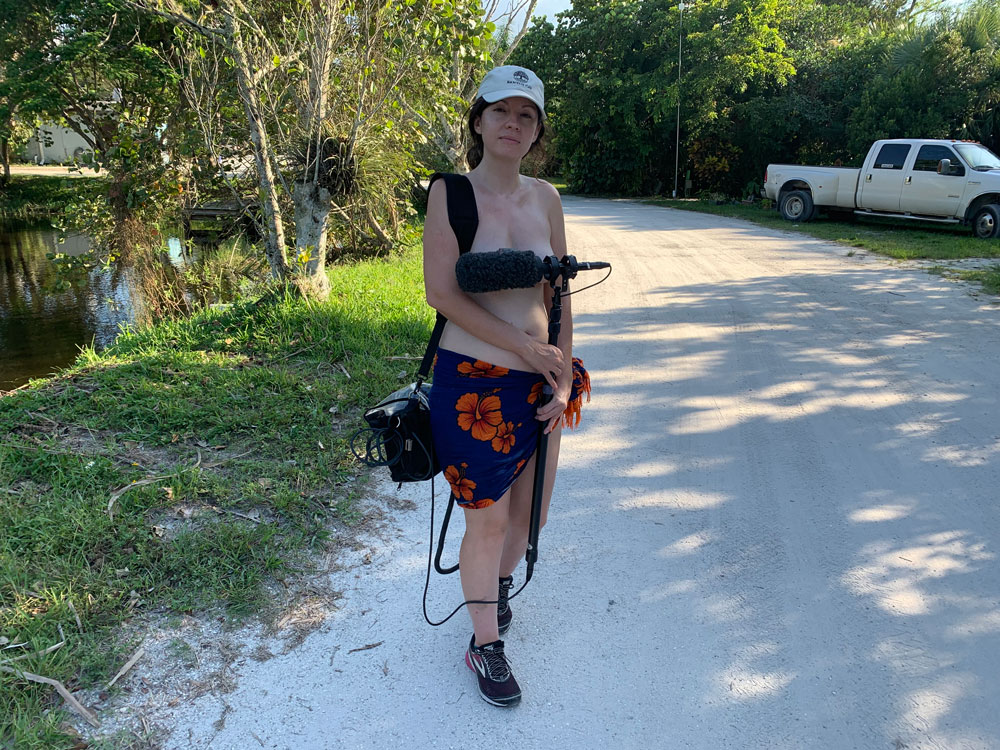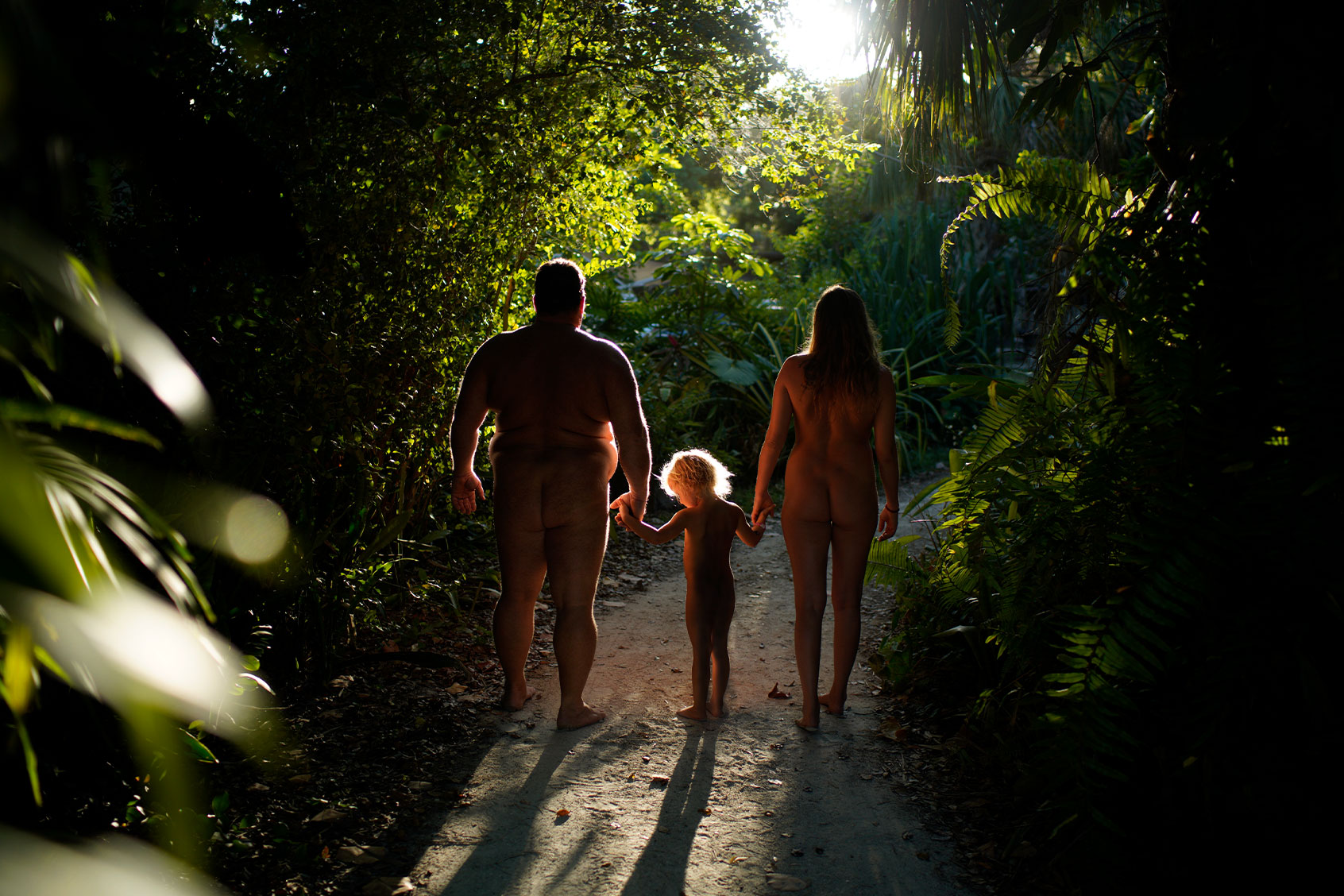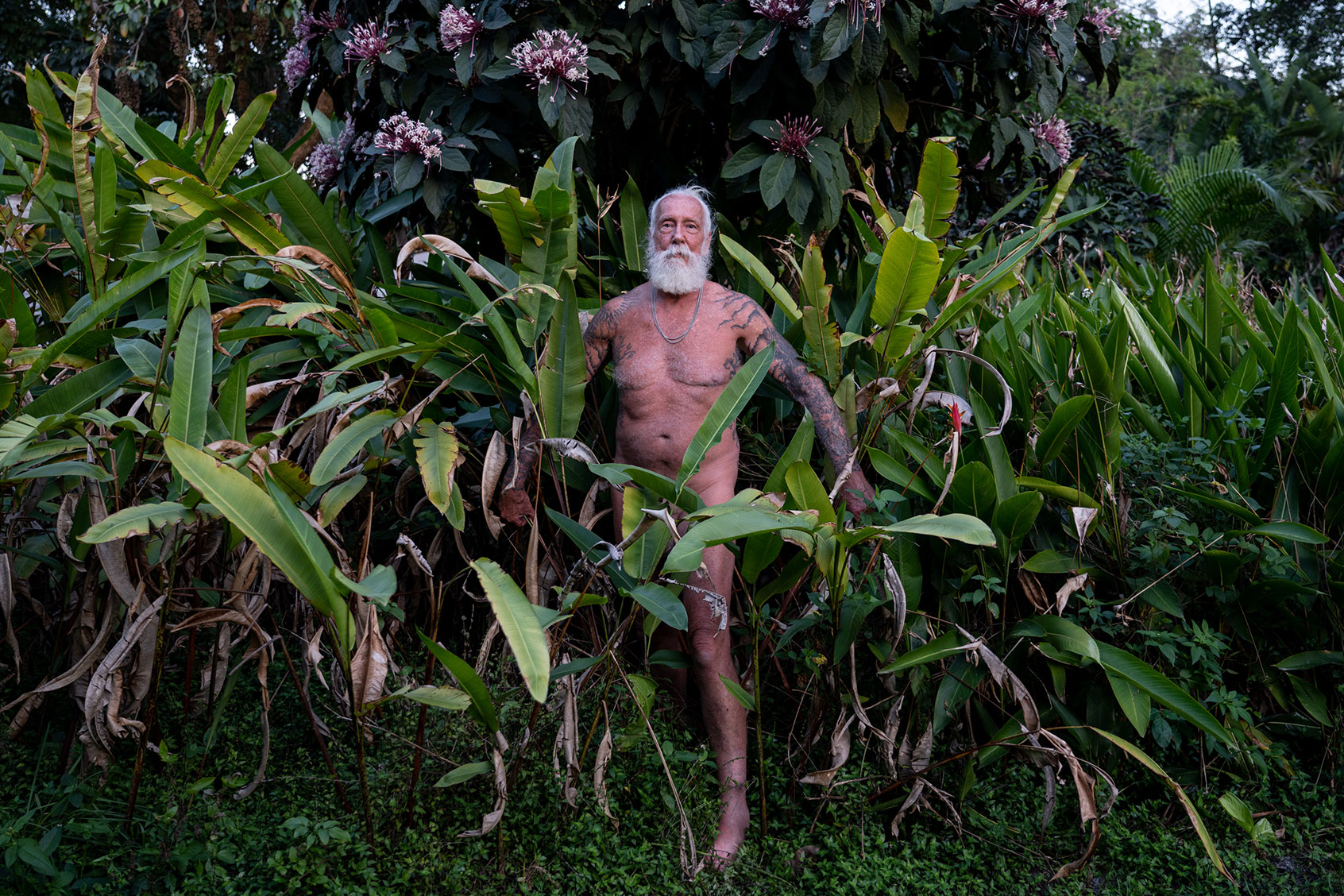“Naked Gardens,” which is having its world premiere at the Tribeca Film Festival, is Patrick Bresnan and Ivete Lucas’ immersive, observational documentary about Sunsport Gardens, a Florida naturist community. The filmmakers, who shot the film in the nude themselves, depict the quotidian life of the residents. Men and women of different ages and races are seen cleaning a motorcycle, playing tennis or basketball, and — gasp! — even cooking and using power tools.
The film eavesdrops on board meetings and attends parties. (In one of the more memorable shots, resort owner Morley sits naked on Santa’s lap.) But “Naked Gardens” is never exploitative; it presents life in this so-called “paradise” without judgment. The film culminates in a Midwinter Naturist Festival that captures the residents and guests participating in various activities that people often do in the nude, such as swimming and meditation.
Bresnan and Lucas immerse viewers in the safe space of this community, and conversations address issues of body shame, and the issues that some residents have about having to wear clothes. But “Naked Gardens” is not skin deep; the film reveals underlying concerns about the housing crisis, education, and economic inequity, among other topics.
RELATED: Paris museum welcomes nudists for a day
The filmmakers spoke to Salon about their modest, absorbing documentary.
How did you come to learn about this community and decide to make a film about it?
Patrick Bresnan: I had seen Sunsport pop up on the cover of the “Palm Beach Post” for years. There was a very particular headline I saw where Morley was naked on the cover of the “Palm Beach Post” and it said: “Nudist Resort Tries to Get Back to Normal after Stabbing.” I just thought, that was so wild, like something you’d see in a tabloid. I became interested in Sunsport, and was thinking of shooting a short film there to learn more about it. Then, when we were shooting “Pahokee” and I was in a Costco parking lot and this woman in her late 60s came up to me and said, “There is a drum circle and a big bonfire at the nudist resort, and you don’t have to pay an entrance fee! You should really come!” I just thought that was so wild. But it was also really beautiful, because she was kind of a hippie and she thought I was a likeminded person. What we came to learn is that they really tried to recruit younger people. They don’t want this way of life to die off; they want to hand it off to the next generation, so there is a campaign to recruit young naturists. Once I was propositioned in the parking lot of Costco, I thought: We have to make a film here!
Can you talk about your own thoughts on nudism or naturalism, and the appeal of this topic? Why are we all so fascinated with nudity?
Ivete Lucas: I think mainly because we are covered all the time. [Laughs] When Patrick told me about the place and we went there the first time, I was interested in making a film because the portrayal of nudity I’ve seen in the media has always been very sexy or sensualized, and very aspirational in terms of bodies. It was really amazing to see these body types walking freely. I liked the opportunity to capture it in a way that was not sexualized or sensationalized, just matter of fact. We cover ourselves so much that we don’t know what real bodies looks like. We see models or guys with six packs and almost never penises. It was an interesting challenge to show the naked body non-stop. All naked, all the time!
 Naked Gardens (Patrick Bresnan)
Naked Gardens (Patrick Bresnan)
What was it like to shoot the film in the nude?
Bresnan: Ivete and I are very counterculture people and not mainstream documentary filmmakers. This was an exciting topic for us because it’s not a topic for “traditional” documentary — find an athlete, a musician or a politician, and follow them and sell it to a streamer. We are trying to go against that methodology. What was so exciting was that it was a film that required an enormous challenge for us, which is to bare ourselves to the community. A lot of filmmakers can hide behind camera or come and go. But here, the community wasn’t going to let anyone into their interpersonal lives if they had clothes on.
Lucas: There was a level of trust that has to happen to be naked in front of each other, so if we were wearing clothes, we were breaking that [trust]. It was important for us not to be wearing clothes. We make experiential films, and it takes months of living with the community. We wanted to get naked and see what that was like. Why is nudity so appealing to us? There is still this childish thing of taking your clothes off and laughing. This resort is such an extreme lifestyle that they are often the laughingstock, so for us to break through that layer of “we’re all naked, let’s giggle,” we had to really embody that and make a film that was much deeper.
What decisions did you make in telling the residents’ stories?
Bresnan: What was so appealing upon our first tour of the resort was that it wasn’t a retirement resort; it was an attempt at an alternative, socialist community, but also a community where there were Republicans, people who were not nudists, and a community that was trying to address the housing crisis. It’s the cheapest place to live in southern Florida. People were trying to make it work. Sometimes it doesn’t work very well. If you are a retiree from Quebec, and you have a $200,000 camper home, you are living side by side with people who are on government assistance. It is an interesting and complex world. We explore a lot of that visually.
Lucas: They talk about themselves as a “family naturist resort,” and you see retirees. We wanted to know more about what this family nudism and naturism meant, and who were the families that were living there year-round. We are not asking for the backstories; we want audiences to be active participants. There are clues that make you understand why they are there, and that was the way we followed them — to understand why they were there, and what did it mean to make this choice with their family. When we were filming, I was pregnant and nude. Because I was pregnant, I was interested in the mothers living there with their children, and what that life was like.
Want a daily wrap-up of all the news and commentary Salon has to offer? Subscribe to our morning newsletter, Crash Course.
You are not very invasive in your approach. I like that you often keep a distance and just present lives without defending or condemning these people. Are you advocating this lifestyle?
Lucas: What we tried to do is not simplify things. In documentary, especially, people are told how to morally think about what they are about to see or try to simplify it as all good or all bad, but the reality of human existence is that there are good and bad and difficult things. The meaning of the film is in the journey you go through watching the film. There will be different journeys for each viewer and a questioning of your preconceived notions. The people in the film talk about judgment. It’s natural for us to judge, so you are confronting that within yourself.
Having done it, I was scared being a woman. I have always felt sheltered in being covered. It is an extreme thing to do to vow to be naked all the time. We had to use a lot of sunblock and bug spray because we are in Florida. We got to appreciate a lot of functional things about wearing clothes, such as clothes catch your sweat, and they have pockets. If you ask me, I’m not a nudist, but I like to have the freedom to take my clothes off and not feel ashamed about my body.
Bresnan: I do think we are advocating for the people you see in the film. They are living behind a wall in a gated community. In the world outside that wall are a lot of churches. There are people in our film when they said where they lived, they were shunned from their church. The film advocates that these are valuable people who have complex lives and situations that have led them to this lifestyle. They are very decent people who commune in the nude.
I am curious about cooking and using power tools in the nude . . .
Bresnan: There is a lot of performance in all of cinema and documentary. For people opening their bodies up for a film like this, it is fun to show off cooking or building a deck or cutting wood.
Lucas: I think there are people who are more extreme about their beliefs and how much nudity they need to live. Jeremy, one of the participants, will not put on clothes. It could be super cold, and he would not get dressed. People who garden do wear pants. It’s that debate about nudism vs. naturalist. The younger generation wants to be naked when they want. The more extreme, pure nudists believe you have to be nude all the time.
Do you think that being in a nudist colony creates a greater sense of self-worth as several participants suggest?
Bresnan: There is a tribalism. Some of our main protagonists are castaways from their previous lives. Gretchen had just lost her spouse and barely receives visitors from the outside world. The idea of coming together and connecting while naked is something that we, who are at our computers or in the world all day long, lose.
Lucas: When we cracked the surface of just seeing naked bodies and started getting to know people, we understood most of them had trauma they are trying to get over. Whether it was sexual trauma or having different bodies — the owner [Morley] had polio as a child. Coming together for something deeper than just being naked together — to heal together and empower each other and care for each other. It does provide a sense of community that is very strong.
 Naked Gardens (Patrick Bresnan)
Naked Gardens (Patrick Bresnan)
I need to ask about the child nudity in the film. Child nudity been controversial in the photographs by Sally Mann. Can you discuss filming the young children, or scenes like Serenity’s birthday party, where she is clothed but surrounded by older, naked men?
Bresnan: What we are recording is very much life as the way it is there. They did allow us to film — we weren’t censored unless someone didn’t want to be recorded. What you are seeing at Serenity’s birthday and other scenes in the film is everyday life there. I think they are hard scenes to watch, for sure.
Lucas: We are not used to that. But we set out to make this film about a family naturist resort. We were filming everyday family life, and that included children who were naked, or surrounded by naked men and women. It is part of our obligation to include scenes that could be controversial or scary for some who are not used to seeing that.
If you didn’t show it, viewers would wonder about it.
Lucas: It would be as if we were almost hiding it. Mann was posing the children. We are capturing what was unfolding. We did make a rule not to have full-frontal nudity of children, so it wasn’t misused, and we talked to the parents about that; we were all in agreement. That’s how we could show the reality without being intrusive. We [show] that these lives are being led in this way.
Bresnan: Having been the cinematographer of the film, I didn’t have an inspiration from Sally Mann. It was more the work of Diane Arbus and Dorothea Lange, who was photographing very poor families on the margins in the dustbowl. All of the frames were chest to head. We were extremely sensitive when filming around families. We were never alone with children. There were never crew members alone at the resort. We always had a minimum of two people together at all times. There were rules and protections for the community. We also thought about Frederick Wiseman’s “Titicut Follies” because there are scenes where we see fully nude incarcerated mentally ill adults. Those scenes are incredibly hard to watch. Wiseman laid a foundation on how to make a film like this. We have to portray these scenes so that judgments can be made as to whether this is something that needs to be looked at further.
What can you explain about the nature of the culture? I was concerned about the lack of education for the youth, and there is a discussion that some residents were living in Sunsport Gardens because it was cheap.
Lucas: We wanted to limit to what happened inside the resort and in a way that is effective. Once people say, “I’m going to be nude,” then you can’t be nude the way you want in every environment in society, because social nudity is not accepted outside the walls of the resort. The more that you spend time there, the more you find ways to continue your lifestyle to be as nude as much as possible. People get employment in the resort. Jeremy works there. Some do have to go outside [the resort] and get dressed to make a living, but they try to find ways to make a living without having to wear clothes. In terms of education, a lot of kids are homeschooled. That is an American reality, too. They are protecting themselves from the outside world. When the kids would go to school and people found out they lived in the nudist resort, they were bullied.
The scene of 11-year-old Serenity struggling with simple math was very painful to watch.
Bresnan: The backstory with Serenity is very complex. They were living in a car in Miami. They needed a place to live and fell in love with a camper for sale at Sunsport resort for a few hundred dollars. The needed a place to live and the rent was so cheap, they stayed. Serenity’s education was on hold before they arrived at the resort. The scene is very hard, but we have to face the fact that children living in poverty and on fringes of society are not getting the education they need. We have a great deal of sympathy for her. It is very important scene; we need to think about kids like her who are not getting a proper education.
Lucas: It’s obviously not representative of the nudist lifestyle. It’s a cheap place to live when you can’t afford to live somewhere else.
There are discussions of social nudity, nudism, and naturalism. People talk about their issues with wearing clothes. What do you want viewers to consider as they watch your film?
Brosnan: We have a whole system that classifies films as NC-17 or X that has vilified nudity and the human body when it is exposed in a non-sexual manner. What we are hoping people take away is that the human body is not something offensive, that we should hide away, and there are many beautiful forms of the nude body regardless of weight or size, or physical appearance.
What is very profound is that many people at the resort had extreme trauma because they had genitals that were considered imperfect, and by exposing themselves in a healthy, non-sexual manner, they were finding acceptance from people in this community and healing from pain sadness and shame. I think that those are just some things that I took away that I hope some of the audience can gather.
Lucas: Nudity is not indecent. It is what we do with our naked bodies that could be. If we could take away that fear of the naked body . . . As a woman who grew up around a lot of women who are extremely traumatized by the imperfections of the human bodies, I would say that if I had seen more naked bodies growing up, my friends and I would have saved ourselves some eating disorders. After having this experience, when I had my baby, I was not afraid of breastfeeding in public anymore. I always thought when we walked into resort, that it would be this image of everybody naked, but after being there and walking out in the “textile world,” as the residents would say, I would look at everyone dressed and question it. I saw what we do with our clothes to show each other who we are, or what our social status is. What are the contexts where we can be dressed and can’t be dressed? It’s questioning our perceptions of nudity.
Brosnan: There is a real sense of freedom they are trying to achieve — and achieving. Hopefully, some people will see the film and get the courage to explore, even if it is something as simple as being comfortable at the gym taking a shower. We all suffer some form of shame over our bodies. We hope it is inspiring to see people who are really taking action.
More stories to read:

